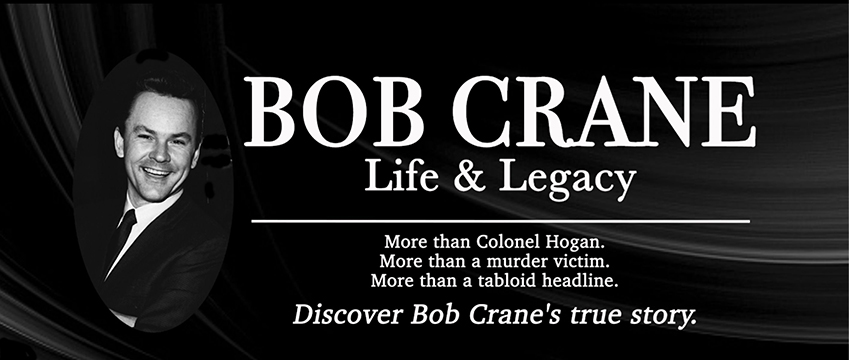by Carol Ford
I have started writing this post several times. And in light of Amy Winehouse's tragic and untimely passing, it becomes even more pressing for me to do so.
This site was created to inform people about Bob Crane's accomplishments in radio and the entertainment industry for the purpose of his induction into the National Radio Hall of Fame. This is a place for people to see, hear, and learn about the good things Bob did in his short life. And there are many.
But it is also impossible to ignore the elephant in the room any longer. Bob Crane did have his demons, and they ultimately led to his murder and the scandal that followed.
But should this define a person entirely?
One Internet search will tell you: Bob Crane is perhaps one of the only murdered celebrities whose memory receives little or no respect. Not knowing the full story and presented with skewed and often inaccurate information, people have been quick to judge. Bob is the star in a recurring media circus that has become a runaway train.
But should this define a person entirely?
One Internet search will tell you: Bob Crane is perhaps one of the only murdered celebrities whose memory receives little or no respect. Not knowing the full story and presented with skewed and often inaccurate information, people have been quick to judge. Bob is the star in a recurring media circus that has become a runaway train.
It is a sensitive issue. On the surface, he appeared to enjoy his lifestyle. On the inside, however, he was deeply troubled. Shortly before his death, Bob confessed to a minister that he was battling an addiction to sex (only with consenting adult women), and he wanted to change. While it was not a substance addiction, Bob realized it was something he could not control, and for the sake of being a better father to his children, he sought professional help. He was on the brink of starting his life over, only he was never given the chance.
We publicly mourn the death of those who have been taken from us much too soon, and Amy Winehouse is only the latest on a long list of celebrities who have battled addiction, whether it be to a substance or a behavior. When such a rare talent is taken from the world prematurely, it is, for lack of a better word and at the very least, unfair.
Bob Crane's talents and multiple contributions to the entertainment industry have been overshadowed and nearly forgotten over the decades. Mention of his work in radio is merely a postscript, when in fact, Bob changed and shaped the world of radio over the course of nearly two decades. His work on Hogan's Heroes "gave joy to millions." He was a gifted theater actor and director, as well as a talented musician and drummer. And in the final months of his life, he was working on a new television pilot set in Hawaii. At 49 years of age, he was nowhere near ready to leave this world.
Would Bob have been able to change? We will never know. It would have been, without a doubt, a long and difficult journey. However, many people who knew him well believe that he was determined enough to do so. Those who knew Bob remember him as a man who was kind, generous, and caring, He was a "gentle man" who loved his family and friends. He has been called a "genius" in radio, was an "actor's actor," and most of all, he loved his children dearly. Bob was not the depressed and pathetic individual portrayed in the film Auto Focus. He was a happy, intelligent, and caring man who "was kind to those he worked with and was kind to those he knew."
Bob's friend and fellow radio colleague, Joe Cosgrove, remembers Bob this way: "Everybody has a dark side. Everybody thinks ugly thoughts. Everybody has a history to their life. Let’s not paint this guy’s life by - what shall we say? - the moments in his life... I say these things that are the flaws are specks on the Parthenon. Let’s look at the Parthenon and let’s not look at the specks. Let’s lift our eyes up to the man’s eyes and soul and life and not look down on the gutter. When I think about Bob Crane, I think about a ray of light. I think about a person of love. His legacy should be a creative genius who brought laughter and good family entertainment to millions of people. And his legacy should be smile, smile, smile no matter what happens in life. That’s how I remember Bob Crane, and that’s how Bob Crane should be remembered."
As you remember Amy Winehouse, remember her for the talent she possessed and the goodness that was in her heart. Do not allow her flaws define her. When you remember Bob Crane, remember him the same way.
Their flaws are but specks on the Parthenon.
* * * * * * * * * * * * * * * * * * * * * * * * * * * * * * * * * * * * * * * * * * * * * * * * * * * *
Note: For more about addiction, read the CNN article, "Amy Winehouse and the Mysteries of Addiction" by Dr. Itai Danovitch, Director of Addiction Psychiatry Clinical Services; Associate Director of the Addiction Psychiatry Fellowship; and Assistant Professor of Psychiatry and Behavioral Neurosciences at Cedars-Sinai Medical Center in Los Angeles.
Joe Cosgrove was a staff announcer at KPOL in Los Angeles in 1956 and was one of the first people to welcome Bob Crane to the West Coast. He is the founder of KTHO in Lake Tahoe, CA, and continues to broadcast regularly.
